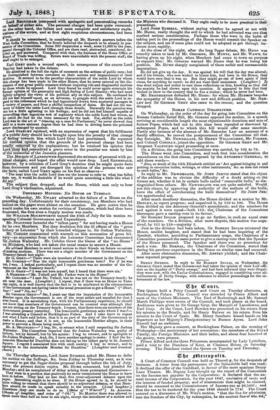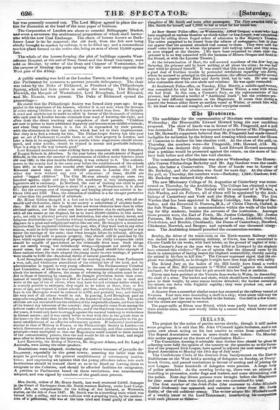gbe jifletropolts.
A Court of Common Council was held on Thursdry, for the despatch of' business. A letter from the patronesses of the Spitaitields ball was read: it declined the offer of the Guildhall, in favour of the more spacious Drury Lane Theatre. Mr. Deputy Lott brought up the report of the Committee on the Income-tax payable by the Corporation: it declared that the an- nual income of the Corporation, for the year 1847, exclusive of rents and the interest of funded property, and of abatements that might be claimed, should be returned to the Commissioners of Income-tax at 26,5491.; and that the tax to be tendered for the year 1849 should be 774/. The Court entered on a discussion of' Mr. Wire's motion, "that the fine for admission into the freedom of the City, by redemption, be the ancient fine of 46s. 8d.,"
but was presently counted out. The Lord Mayor agreed to place the nos ties for discussion at the head of the next paper of business.
• The Corporation of London are about to remodel Billingsgate Market, sod erect a structure the architectural proportions of which shall harmo- nize with the new Coal Exchange. The chain of houses known as Darks house Lane is to be removed : the old dock, -from- the fish now being chiefly brought to market by railway, is to be filled up; and a commodious market-place formed on the entire site, being an area of about 15,000 square feet.
The 'whole of the houses forming the plot of buildings opposite West- minster Hospital, at the end of-Dean Street and the Broad Sanctuary, were said on Monday, by-order of the Dean and Chapter of Westminster, for the purpose of forming: the great opening for the • new street opposite the' 'West gate of the Abbey.
A public - meeting Was held at the London Taverns on: Saturday-; to peti- tion Parliaweent-for measures to prevent juvenile delinquency. The-chair Was taken hrthe Duke of Richmond, as President-of-the Philanthropic Society. which had been active in calling the meeting. 'I Im Bishop of girwich, the Marquis of Westminster' Lord Bfougham, Lord Kinhaird, and Mr. Ricardo, were present. The Duke of Riehmond opened the premeedings- He stated that the Philanthropic Society, was formed Sixty years ago: he ap- p ealed to the experienee of his hearers, whether it is not now, when the increase of crime among children is so great, much more needed than then. He thoughts it cruel and unchristian to tnakeno effort in favour •of'theahonsands of children Who each year iv-London become criminals from want of knowing the right, and often from-the' direct teaching and compulsion of their- parents.. "Children' are sent to prison to learn additional depravity and become more-skilful criminals; atal when- they return home it is but to be reproached by their- parents, • the e clumsiness in -their last crime' which had led to their imprisonment. Our- duty ism find a remedy fur -thin. The Philanihropio Society has this -year got an act of Parliament to enable them to bell their property in London, and take a farm in its neighbourhood, where youths whom magistrates should recom- *end,. and other youths, should be trained in morals and profitable industry.
i That s a step in the way towards good."
Lord Kinmord mentioned some striking facts in connexion with the formation' of Ragged Schools in Aberdeen. In -the year before the establishment of Ragged Behoula, in the town the number of commitments of children under fourteen years old was 1304 in the nine months following; it was reduced to 6. The commit- ments in the county had in the same year before the establishment of the schools been 860; in the sarne nine months- after their -establishment, only 14. Lord Rionaird stated that there are 100,000 persons in • London who till the other day were without any sort of education: of these, 30,000 are called "ragged children." The . City Idipaion already,. employs some two hundred- agents, night and day; but this machinery is very inadequate, and legislative aid is necessary. In Scotland, the cost of training one child in good principles and useful knowledge is about Si. a year; at Westminster, it is about L: but the average cost of transporting and keeping abroad one convict is be- tween 1001.and 1501. Thee, the education of 'children is a far cheaper preventive of crime than the punishment of criminals.
Mr. Milner Gibson thought it a fact not to be lost sight of that, with all our
there' is in our society a substratum of absolute barbs- ism. He Aid- not say- he thought there are worse elements here than in other civilized nations, nor that crime can here or anywhere else be extirpated; but, with all the means at our disposal, for Us to leave 30,000 children in this metro- polis, not only in physical poverty and destitutiens hut also in mental, moral, and religious destitution—as-" heathens without heathen gods "—is a foul scandal and 'proms to a great and enlightened nation like our own. lie thoughtit a monstrous uijustice that the neglected children of the poor, who, if they were born in any other 'station, would be held under the tutelage of the family, should be regarded as not under the tutelage of the state; that when' brought before its tribunal, although legally held tO be unfit to possess -property, they should still be punished by the laws which -regulate the security of property; that the civilly irresponsible child should be capable of punishment as the criminally' felon man.- Such things are not- merely wrong, but ridiculously wrong—repugnant- not merely to the moral sense, but also to common sense; and- England- should take example of those nations-where the state adopted the young under imown tutelage, if parents were unable to fulfil the .ducational duties of natural guardians.. Lord Brougham' supported the object of the meeting to obtain from Parliament a wise, safe, and wholesome amendment of the criminal law of the land, and its administration in regard to very young offenders. The Parliamentary-Criminal Law Committee, of which he was chairman, was unanimously of opinion, that to check the increase of offences, the means of reforming-by education must be ad- ded to those of deterring by example. Ile thought prevention better than cure: instead of merely taking boys to a Bell or Lancaster school to learn to read and write at the age of ten or eleven, when they have formed criminal habits which it is scarcely possible to extirpate, they ought to be taken at three, four, or five yearn of age, and trained in infant schools; and then, doubtless, the 30,000 ragged boys in the Metropolis would be reduced to 3,000, and probably less; and thereby the very root of- all crimes would be cut, in passing, Lord Brougham paid an emphatic-compliment to Robert Owen as the founder of infant schools. The ranks of crime are not recruited from the children of the respectable classes, nor from thew of the honest day labourers of the country: they principally come from among the Inferior ranks of our humble fellowsubjects; and if the State took them at their ten- der years, it wetted only have to struggle against the natural tendency to wickedness in human nature; and it was sorely better to deal with this in the gristle than in the tonea-in the child than in the boy. Governmentaid is indispensable to the ge- neral establishment of an effective reformatory system. If industrial institutions similar to that of hlettray in France; or the Philanthropic Society in London—to which Government already sends a few _p_risoners annually, and thus sanctions its principle—swere multiplied so that our Magistrates could commit to them instead of the contaminating prisons; then the nail would be hit on the head, • and might Mon -after- be driven -home-by the benevolent public. Lord Ilarrowby, the Bishop of Norwich, Mr. Sergeant Adams, and Dr. Lang. of Australia, were among the other speakers.
Resoadtions wore-adopted- declaring the serious increase of juvenile de- linquency; especially- in, the great- towns; asserting the belief that this Might be prevented by the general establishment of reformatory institu- time; and expressing an opinion that the young.offenders taken into such institutions should be trained there so as to-be fitted-on leaving them to emigrate to the Colonies, . and should be afforded facilities for emigration. A petition to Parliament based on these resolutions, was unanimously adopted, and was signed by numbers of the gentlemen present.
Milli Smith, widow of Mr. Henry Smith, last week recovered 2,0001. damages in-the Court of Exchequer from the North-western Railway, under Lord Camp- bell's Act, as compensation for the killing, of her husband, at Wolverton station, on- the 5th oh June 1847. Mr. Smith was in a travelling train which was turned into a siding, and so into collision with a-standing train, by the careless-
fleas of a' plliceman, who was at the time tried and found guilty of the man-
an- slaughter slaughter of Mr. Smith and Some other passengers. The Jail awarded 801g-to Mrs. Smith for herself, arid 1,2001. to her in trust for her infatt eon: At Bow- Street Police-office, on Wednesday, Alfred Grogan, a man 'who had been employed at various theatres as check-taker or box-keeper, was cotranitted for trial for selling divers forged orders of admission to Her Majesty's Theatre, The orders purported to be issued from the editors of newspapers; but it- does not appear that the accused attached real names to them. -They were sold for small sums to persons to whom the prisoner told varying tales; and they were at once stopped at the theatre. [We have been requested to state that the prisoner is in no way connected with the business of Blesses. Grogan and Scott in the Strand, or with the Lyceum Theatre.] At the reexamination of Hart, the self-accused murderer of the Jew boy, on Saturday, the prisoner said he knew nothing at all about the crime: he was ham mad When he accused himself: It was stated that this man had given the-police a good deal of fruitless trouble by pretended - revelations regarding one Jervis, whom Be-accused as principal in the assassination: the offieers searched for-several days in the qtarter 'where • Hirt said Jervis lived, but in vain. He also made- falba statements about- his own abode and relations: He was again remanded.
At Southwark -Police-office, on Tuesday, Ellen Merritt, a middle-aged Woman,. was committed for trial for the murder of Thomas Winter, a man with whom: she had lived. In this case, a Coroner's Jury, on the representations of the. prisoner, had returned a verdict of "Accidental death"; but the evidence pro- duced a very different impression on the Magistrate. It seems that during .a quarrel the woman either thtew an earthen vessel at Winter, or struck him with,-
: his head was-cut and mangled, and a fatal erysipelas ensued.



























 Previous page
Previous page